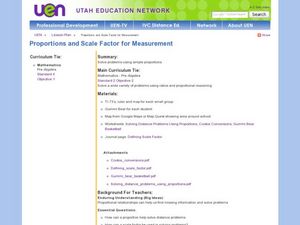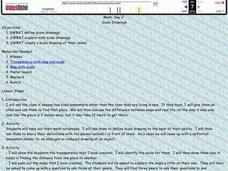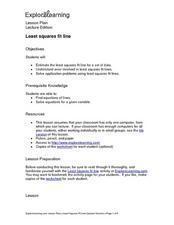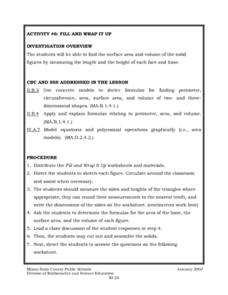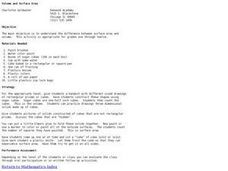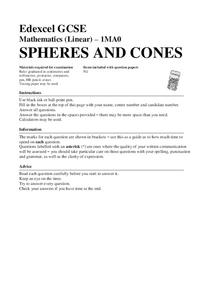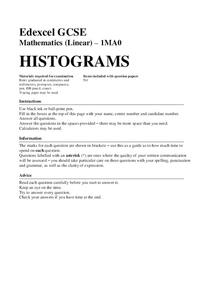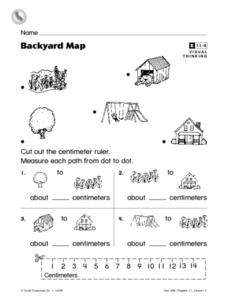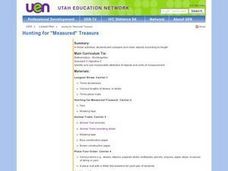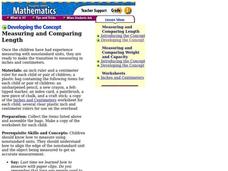Curated OER
Vectors: How Much Force Can You Apply
This lesson entails the viewing of two videos to get an overview of force and its application. The lesson covers how vectors use force in real-world situations.
Curated OER
Twists and Turns
Students reflect, rotate, translate, and dilate figures in the Cartesian coordinate plane using grid paper and dot paper. They use transformations (i.e., reflections, translations, rotations, and dilations) to describe geometric patterns...
Curated OER
Proportions and Scale Factor for Measurement
Learners explore the concept of proportion. In this proportion lesson plan, students use google maps to find the distance the their school is from home. Learners discuss what a scale factor is through teacher led discussion. Students...
Curated OER
Scale Drawings
Learners explore scale drawings. They use maps to investigate scale drawings. Students create a scale drawing of their own island.
Curated OER
Around the Town
In the world of GPS, make sure your kids can still read maps and determine distances between locations. You will need neighborhood street maps, ideally of your class' home turf. Ask kids questions about different locations in relation to...
Curated OER
Least Squares Fit Line
Practice makes perfect! Learners estimate the least squares fit line for a set of data. They understand error involved in least squares fit lines, and solve application problems using least square fit lines.
Curated OER
Fill and Wrap It Up
Students find the surface area and volume of the solid figures by measuring the length and the height of each face and base. They use concrete models to derive formulas for finding perimeter, circumference, area, surface area, and volume...
Curated OER
Volume of Rectangular Prism and Cylinder
Learners calculate volume of rectangular prisms and cylinders. They draw and label figures to use the formulas to calculate the volume of rectangular prisms. In addition, they use objects to calculate volume in a hands on activity.
Curated OER
Volume and Surface Area, A Sweet Activity
Geometry.... sweet! Using sugar cubes, learners build rectangular prisms of different sizes and shapes. They glue them together and assess volume. Then they color the outer sides to visualize and compute surface area. To make a visceral...
Mathed Up!
Simultaneous Equations
How do you solve systems of linear equations? Scholars watch a video to learn how to solve systems using elimination-combination. After viewing the video, they solve seven systems of equations.
Mathed Up!
Quadratic Formula
Young scholars explore how to solve any quadratic equation with a video about the quadratic formula. They then use the quadratic formula to solve a set of quadratic equations.
Mathed Up!
Spheres and Cones
Class members learn how to apply formulas for spheres and cones with a video that begins with a review of the formulas for surface area and volume of spheres and cones. Pupils use these formulas to solve problems on a worksheet.
Mathed Up!
Histograms
Class members explore how to read and use histograms by watching a video on creating and analyzing histograms. To finish, the class works on a set of questions that tests these skills.
Curated OER
I Will Meet You In The Middle
Students use the 50 States Quarter Reversal as a context of learning a curriculum concept based from the state of Utah. They research the concepts of cause and effect. Also, they use customary units of measurement to find length and...
Curated OER
Deriving the Formula For the Area of a Circle
Young scholars derive the formula for the area of a circle. They form a rectangle by partitioning a circle using construction paper and scissors.
Curated OER
Measuring Length and Width
Second graders practice measuring length and width of objects in inches. In this measurement lesson, 2nd graders use a ruler to measure the length and width of a chair, desk, and book. Students view a video, "Math Investigations II," to...
Curated OER
Backyard Map- Measuring with Centimeters
In this backyard map centimeter measurement worksheet, 1st graders cut out a centimeter ruler from the bottom of the page. They use the ruler to measure the path between objects which are pictures in the backyard map at the top of the...
Curated OER
Measuring Length
In this measuring length worksheet, students learn to use a rule to measure distances. Students measure the lines to the nearest centimeter. Students finish by drawing lines using a ruler and the given measurements.
Curated OER
Hunting for Measured Treasure
Students compare and contrast objects according to their length. In groups, they travel to different centers in their classroom to participate in different sorting activities. They are introduced to how to use a ruler and reading the...
Curated OER
Strange Paths
In this measurement worksheet, students use a ruler to measure two paths that are not straight. Students answer 3 questions about their results.
Curated OER
Sliding Along
Third graders use a ruler that has a bag tie slider attached to it to measure a number of items. While measuring, they complete a "Sliding Along" worksheet and a "Sliding Synthesis Journal." In the journal entry, they include what they...
Curated OER
Motion in Two Dimensions
Two activities employ the use of kinematic equations for determining projectile ranges. They both require the use of a toy dart gun. Included in this resource are both the teacher's guide and student laboratory sheets. This is an...
Curated OER
Measuring and Comparing Length
First graders use rulers to measure in both standard notation and centimeters. In this measuring lesson, 1st graders discuss the importance of a measuring standard. Students measure in inches and centimeters. Students compare inches to...
Curated OER
Slope
Students calculate the slope of a line. In this slope lesson, students use a graph, an equation or two points to help them calculate the slope of a line. They differentiate between a slope of zero and an undefined slope.


